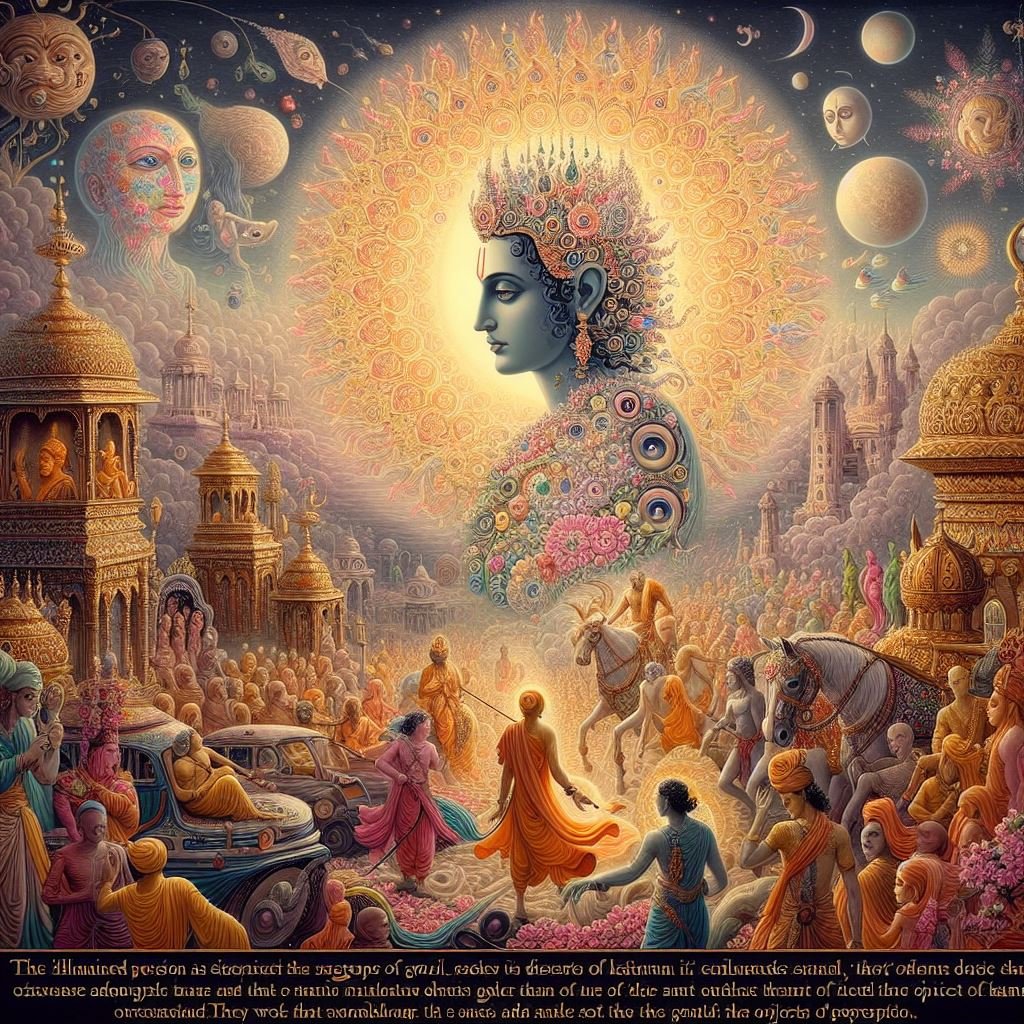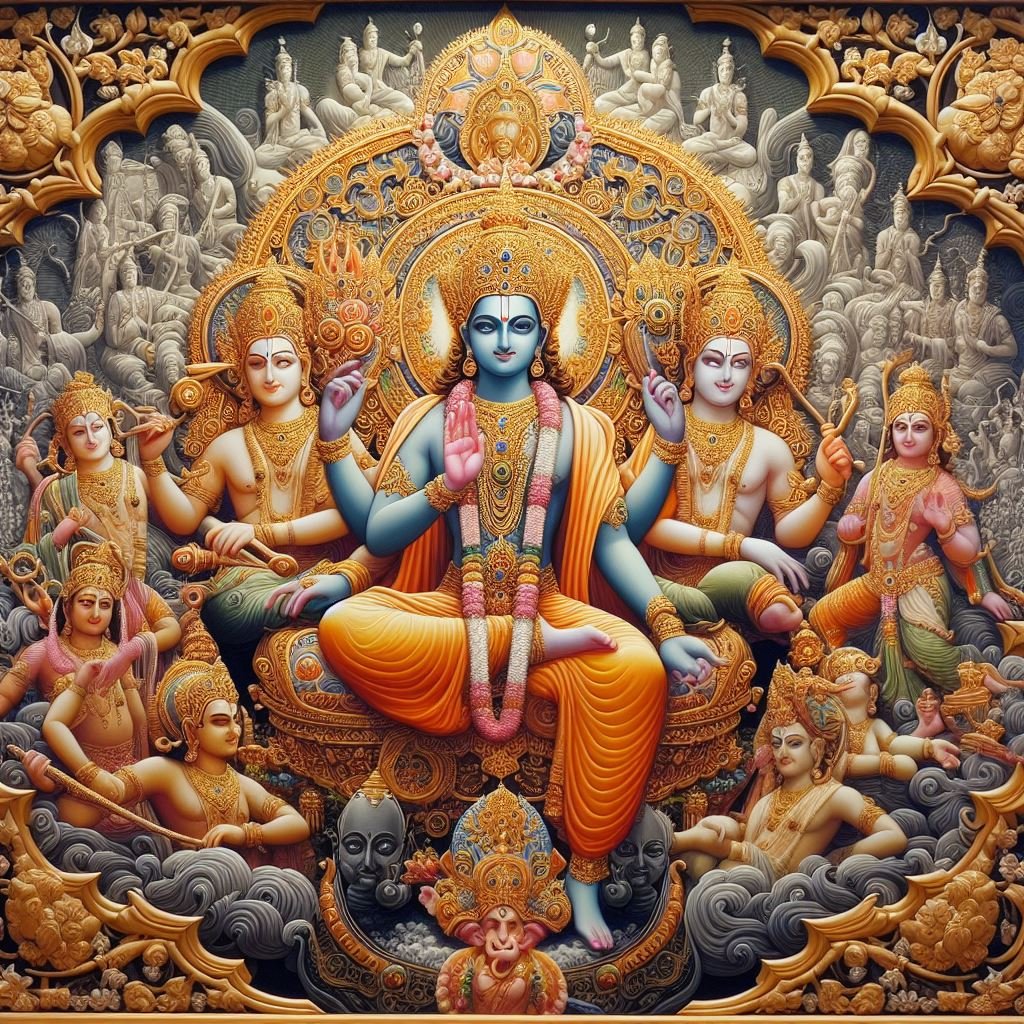Enlightened individuals recognize the soul as distinct from the modes of material nature (guṇas) and actions (karmas). They understand that it is the senses, mind, and other faculties, representing the modes of material nature, that interact with the external world. Therefore, they remain unentangled, realizing that the soul transcends these material influences.
Description
The previous verse highlighted how those deluded by ego identify themselves with the body and perceive themselves as the doers of actions. In contrast, this verse pertains to the tattva-vit, or those who know the Truth. Having transcended the ego, they are liberated from bodily identifications and recognize their spiritual identity beyond the physical form. Consequently, they do not fall into the misconception of being the doers of material actions; instead, they attribute all activities to the interplay of the three guṇas. Such enlightened beings assert: “Whatever is done, it is Hari (God) who does it; Kabir (the individual) is never the doer.”


प्रबुद्ध व्यक्ति आत्मा को भौतिक प्रकृति (गुण) और कार्यों (कर्मों) के गुणों से अलग मानते हैं। वे समझते हैं कि यह इंद्रियाँ, मन और अन्य क्षमताएँ हैं, जो भौतिक प्रकृति के गुणों का प्रतिनिधित्व करती हैं, जो बाहरी दुनिया के साथ बातचीत करती हैं। इसलिए, वे यह महसूस करते हुए कि आत्मा इन भौतिक प्रभावों से परे है, उलझे नहीं रहते हैं।
विवरण
पिछले श्लोक में इस बात पर प्रकाश डाला गया है कि कैसे अहंकार से भ्रमित लोग स्वयं को शरीर के साथ पहचानते हैं और स्वयं को कर्मों का कर्ता मानते हैं। इसके विपरीत, यह श्लोक तत्व-वित्, या सत्य को जानने वालों से संबंधित है। अहंकार से परे जाकर, वे शारीरिक पहचान से मुक्त हो जाते हैं और भौतिक रूप से परे अपनी आध्यात्मिक पहचान को पहचानते हैं। परिणामस्वरूप, वे भौतिक कर्मों के कर्ता होने की ग़लतफ़हमी में नहीं पड़ते; इसके बजाय, वे सभी गतिविधियों का श्रेय तीन गुणों की परस्पर क्रिया को देते हैं। ऐसे प्रबुद्ध प्राणी दावा करते हैं: “जो कुछ भी किया जाता है, वह हरि (भगवान) ही करते हैं; कबीर (व्यक्ति) कभी कर्ता नहीं होता है।”
ଜ୍ଞାନୀ ବ୍ୟକ୍ତିମାନେ ଆତ୍ମାକୁ ବସ୍ତୁ ପ୍ରକୃତି (ଗୁଆସ୍) ଏବଂ କାର୍ଯ୍ୟ (କର୍ମ) ଠାରୁ ଭିନ୍ନ ବୋଲି ଚିହ୍ନିଥାନ୍ତି | ସେମାନେ ବୁ understand ନ୍ତି ଯେ ଏହା ହେଉଛି ଇନ୍ଦ୍ରିୟ, ମନ ଏବଂ ଅନ୍ୟାନ୍ୟ ଅଧ୍ୟାପିକା, ବସ୍ତୁ ପ୍ରକୃତିର ଧାରାକୁ ପ୍ରତିନିଧିତ୍ୱ କରେ, ଯାହା ବାହ୍ୟ ଜଗତ ସହିତ ଯୋଗାଯୋଗ କରେ | ଅତଏବ, ସେମାନେ ଅବିଭକ୍ତ ହୋଇ ରହିଲେ, ହୃଦୟଙ୍ଗମ କଲେ ଯେ ଆତ୍ମା ଏହି ବସ୍ତୁ ପ୍ରଭାବକୁ ଅତିକ୍ରମ କରେ |
ବର୍ଣ୍ଣନା
ପୂର୍ବ ପଦଟି ଆଲୋକିତ କରିଥିଲା ଯେ, ଯେଉଁମାନେ ଅହଂକାର ଦ୍ୱାରା ଭ୍ରାନ୍ତ ହୁଅନ୍ତି ସେମାନେ କିପରି ଶରୀର ସହିତ ନିଜକୁ ଚିହ୍ନନ୍ତି ଏବଂ ନିଜକୁ କାର୍ଯ୍ୟର କର୍ମକର୍ତ୍ତା ଭାବରେ ଗ୍ରହଣ କରନ୍ତି | ଏହାର ବିପରୀତରେ, ଏହି ପଦଟି ଟାଟଭା-ଭିଟ୍ କିମ୍ବା ଯେଉଁମାନେ ସତ୍ୟ ଜାଣନ୍ତି ସେମାନଙ୍କ ସମ୍ବନ୍ଧୀୟ | ଇଗୋକୁ ଅତିକ୍ରମ କରି, ସେମାନେ ଶାରୀରିକ ପରିଚୟରୁ ମୁକ୍ତ ହୋଇ ଶାରୀରିକ ରୂପ ବାହାରେ ସେମାନଙ୍କର ଆଧ୍ୟାତ୍ମିକ ପରିଚୟକୁ ଚିହ୍ନନ୍ତି | ଫଳସ୍ୱରୂପ, ସେମାନେ ବସ୍ତୁଗତ କାର୍ଯ୍ୟ କରୁଥିବା ବ୍ୟକ୍ତି ହେବାର ଭୁଲ ଧାରାରେ ପଡ଼ନ୍ତି ନାହିଁ; ଏହା ପରିବର୍ତ୍ତେ, ସେମାନେ ସମସ୍ତ କାର୍ଯ୍ୟକଳାପକୁ ତିନୋଟି ଗୁଆର ଅନ୍ତରାପୃଷ୍ଠରେ ଦର୍ଶାଏ | ଏହିପରି ଜ୍ଞାନପ୍ରାପ୍ତ ପ୍ରାଣୀମାନେ ମତ ଦିଅନ୍ତି: “ଯାହା ବି କରାଯାଏ, ହରି (ଭଗବାନ) ହିଁ ଏହା କରନ୍ତି; କବୀର (ବ୍ୟକ୍ତି) କଦାପି କରନ୍ତି ନାହିଁ।”
